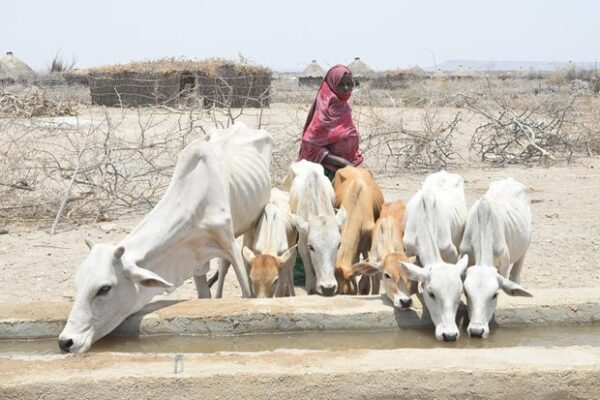Ahead of COP28, the UN’s International Fund for Agricultural Development (IFAD) urges global leaders to shift gears and drastically and urgently scale-up climate finance for small-scale farmers and small agribusinesses, who produce one third of the world’s food and up to 70 percent of the food in low- and middle-income countries. Many are brutally impacted by climate change.
Yet, climate finance going to small-scale agrifood systems has gone down by 44 percent and is now as low as 0.8 percent of total climate finance, falling far short of needs. A new report published today by the ClimateShot Investor Coalition (CLIC) and the Climate Policy Initiative (CPI) reveals.
“This trend is extremely worrying. We are going in the wrong direction. Small-scale farmers, who feed entire communities and nations in the developing world, need to be able to adapt to climate change now. If they don’t, their lives and livelihoods – and global food security -are at risk,” said Alvaro Lario, IFAD President.
Small-scale farmers are often on the climate frontlines, living in vulnerable areas, and exposed to extreme weather events. Crop yields are predicted to fall by up to a quarter by the end of the century. In some cases, yields could drastically drop by up to 80 percent as shown by case studies that IFAD commissioned in 2021. Many of the 3 billion people living in the rural areas of developing counties rely to an important extend on small-scale farming for a living and for their food supply.
Yet, according to the new analysis, “The Climate Finance Gap for Small Scale Agrifood Systems”, climate finance to small-scale agrifood systems (which include small-scale famers, farmers organizations, cooperative and also micro-, small rural agribusinesses serving them), is strikingly low, falling to US$5.53 billion, representing less than 0.8% of global climate finance in 2019/2020. The amount has fallen by 44% compared to 2017/2018 when it reached US$9.85 billion.
This decline in finance is in stark contrast to a general rise in climate finance across other sectors including energy and transport, but parallels a 20 percent decrease for the agriculture, forestry, and other land use sector during the same period.
“Investments are slowing down when they should be drastically accelerating. This is extremely disturbing as solutions to help small-scale farmers to adapt do exist,” said Lario. “We have the know-how and the technology, what we need are investments now.”
Climate resilient and low emission irrigation systems and infrastructure, agroecology and agroforestry practices, better soil management practices, and crop diversification are solutions particularly adapted to small-scale farming. In addition, early-warning and climate information systems, as well as climate proof- infrastructures, such as food storage units and rural roads that withstand flooding are essential to prevent loss and damage.
In the context of national budgets being constrained, and many developing countries currently in difficult debt situations, IFAD calls for the private sector to invest.
“Governments, finance institutions and the private sector all have a role to play to bring more finance to small-scale farming systems. We must convert National Determined Contributions and National Adaptation Plans into investment plans with a pipeline of bankable projects, and deploy innovative financial instruments to de-risk and attract private investments,” said Lario. “Investing in climate-smart small-scale agriculture is good for the planet and is good for businesses, it means more stability and guaranteed commodities supplies.”
IFAD is developing new financial mechanisms to mobilize private investors. In June 2022, IFAD issued its first sustainable bonds, becoming the first United Nations Fund and the only UN body other than the World Bank Group to enter capital markets. Yesterday, IFAD opened the London Stock Exchange (LSE) markets to celebrate the listing of its sustainable bonds.
IFAD has been investing in supporting small-scale farmers to adapt to climate change for more than a decade, through its regular programming investing US$ 1.2 billion mostly for adaptation activities between 2019-2021 and managing Adaptation for Small Scale farmer Programme or ASAP+, a multimillion-dollar climate adaptation fund for small-scale farmers.
To address the urgency, IFAD is stepping up its efforts to channel more climate funding to rural areas. IFAD is committed to dedicating 40 percent of its core resources to climate action, focusing on adaptation, for the period 2022-2024 – up from 35 percent for the previous three-year period (2019-2021). In concertation with its member states, it ambitions to reach a 45% target for 2025-2027.
In time for COP28 IFAD will also be bringing out a white paper for investing in climate adaptive water resilient food systems, that lays out a business case for benefit sharing, bundling, building bankable investments and blending for financing in this area.








